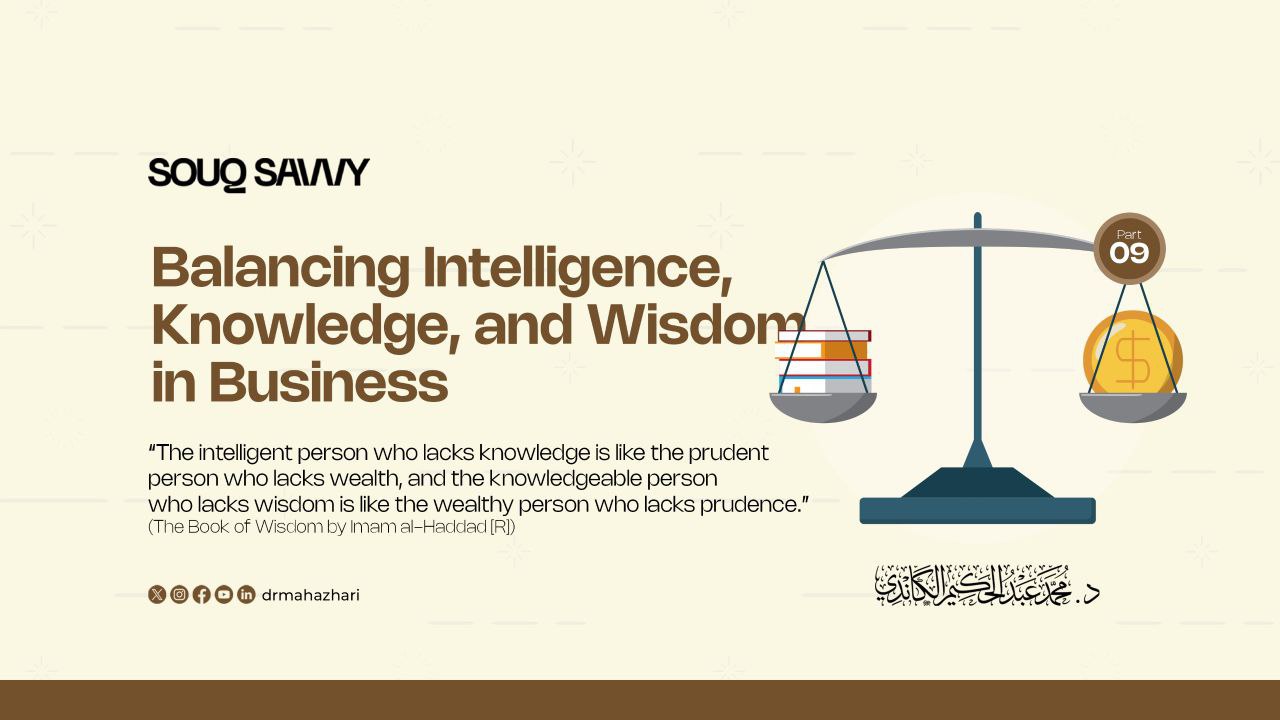Part: 9
Balancing Intelligence, Knowledge, and Wisdom in Business
Dr. MAH Azhari

The intelligent person who lacks knowledge is like the prudent person who lacks wealth, and the knowledgeable person who lacks wisdom is like the wealthy person who lacks prudence.
In business management, there's a profound truth in comparing an intelligent person without knowledge to a prudent individual without wealth, and a knowledgeable person without wisdom to a wealthy individual without prudence. This reflection offers valuable insight into the interplay between intelligence, knowledge, wisdom, and sound judgment—essential qualities for effective leadership and decision-making.
Intelligence, in the corporate world, refers to the ability to think critically, analyze complex situations, and foresee trends. But if it is not accompanied by knowledge—such as data, industry insights, and operational know-how—it remains abstract and ineffective. Much like a prudent individual who knows how to manage money but has no wealth to manage, an intelligent business leader without knowledge cannot implement or test their ideas in meaningful ways. Their potential, though promising, lacks grounding and practical direction.
A real-world example of this can be seen in the tech space, where some startups led by highly intelligent founders with strong technical capabilities failed due to a lack of business knowledge. They built cutting-edge products but struggled to scale, manage teams, or reach the market effectively. Their ideas were brilliant, but without an understanding of operations, finance, or consumer behavior, the ventures couldn’t survive in a competitive landscape.
On the other hand, knowledge without wisdom in management can lead to ineffective or even harmful leadership. A person may have strong credentials and deep subject matter expertise but still make unwise decisions due to a lack of maturity, emotional intelligence, or ethical grounding. This is similar to a wealthy person who lacks prudence—possessing great resources but wasting them through poor choices and lack of foresight.
Consider certain established companies that faced backlash due to tone-deaf marketing or insensitive public statements. These decisions were often made by knowledgeable professionals with years of experience, but the absence of wisdom—such as cultural sensitivity, humility, or the ability to listen—resulted in reputational damage and customer loss. It wasn't a lack of expertise, but a lack of thoughtful judgment.
From an Islamic perspective, the Qur’an and Sunnah give great importance to the balanced integration of intellect, knowledge, and wisdom. Allah says in the Qur’an: “He grants wisdom to whom He wills, and whoever has been granted wisdom has certainly been given much good” (Surah Al-Baqarah: 269). Wisdom (hikmah) in Islamic tradition is not just about intelligence or knowledge—it is about using them in the right way, at the right time, with the right intention.
The Prophet Muhammad ﷺ was a perfect embodiment of this balance. His leadership combined sharp intellect, deep knowledge of human nature, and unmatched wisdom. In moments of negotiation, conflict, community building, or even crisis, he demonstrated calm foresight and moral clarity.
A powerful example of this is the incident of the Black Stone (al-Ḥajar al-Aswad) during the reconstruction of the Ka‘bah. When the Quraysh tribes were rebuilding the Ka‘bah before Prophethood, a dispute arose about which tribe would have the honor of placing the Black Stone in its rightful position. Tensions rose to the brink of violence—every clan wanted the honor, and swords were nearly drawn.To resolve the matter, they agreed to let the next person who enters the Haram decide. It was none other than Muhammad ﷺ, then known as Al-Amīn (the Trustworthy). The moment they saw him, they unanimously said, “This is Al-Amīn; we are pleased to let him decide.”The Prophet ﷺ proposed a wise solution: he spread out a cloth, placed the Black Stone in the middle, and asked the leaders of each tribe to hold the corners of the cloth together.
Then, he himself lifted the Stone and placed it in position. His example teaches that leadership is not just about clever strategies or accumulated knowledge, but about the ability to act with compassion, justice, and sincerity.
Islam also emphasizes that knowledge must be accompanied by action and sincerity. Imam Al-Ghazali classified knowledge into two types: beneficial and non-beneficial. The former brings one closer to Allah and benefits others, while the latter may serve the ego or worldly gain alone. A wise leader, then, must prioritize beneficial knowledge and act upon it with awareness of accountability before God.
Historical Islamic leaders like Umar ibn Al-Khattab (RA) exemplified this approach. Known for his administrative excellence, fairness, and concern for the public good, he implemented reforms that were not only intelligent and knowledgeable but deeply rooted in wisdom and compassion. His leadership decisions were guided by constant consultation, justice, and moral clarity.
Ultimately, whether in business or in life, Islam teaches that intelligence and knowledge are blessings, but without wisdom, they remain incomplete. Just as a wealthy person without prudence is vulnerable to ruin, a knowledgeable person without wisdom can mislead or mismanage. True success lies in harmonizing all three—intellect, knowledge, and wisdom—in a way that benefits others and pleases the Creator.
